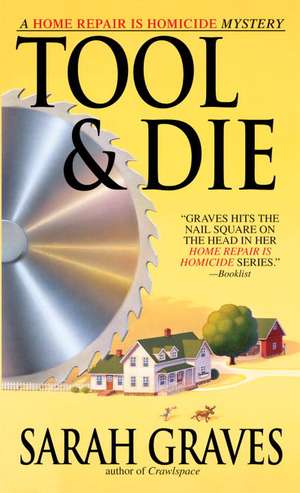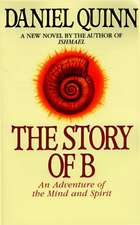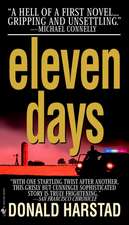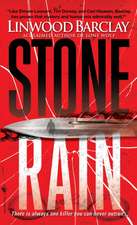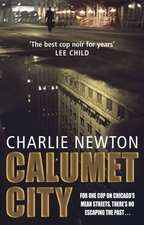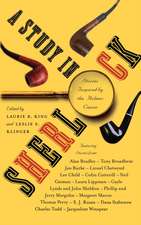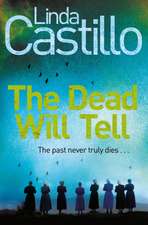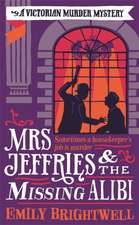Tool & Die: Home Repair Is Homicide Mysteries (Paperback)
Autor Sarah Gravesen Limba Engleză Paperback – 30 sep 2005
It’s a bright June afternoon and old-house-fixer-upper Jake Tiptree is driving through downeast Maine on an unusual errand. She’s getting ready to interview a large, angry man with a criminal history. Jim Diamond may or may not be harassing his ex-wife with life-threatening letters, but Jake promised her new housekeeper, Bella Diamond, she’d look into the matter. An ex-con and a deadbeat, Jim Diamond doesn’t have a history of violence…that is, not until Jake arrives at his apartment and discovers that a killer has been there first.
Suddenly Jake and her best friend, Ellie White, find themselves at the center of a murder with too many suspects and too few clues. And as if that’s not enough, Jake is now saddled with the manic Bella, whose certainty that she’ll be the next victim is fueling a supercompulsive neatness–one that threatens to clean Jake and her long-suffering husband, Wade, out of house and home.
Add to that a moose in her kitchen, a rebellious son with a habit of dumping Miss Right for Miss Wrong, and a troublesome ex of her own, and Jake is already at wit’s end. Then she gets word that a horde of her dad’s long-lost relatives mean to descend on Eastport, intending to be put up at her far-from-fixed-up fixer-upper.
When the killer does strike again, it’s not where Jake expects…and the victim couldn’t be more of a surprise. For this is a case bigger than the usual angry—ex-spouse variety, and now that Jake and Ellie have gotten themselves involved, they’ve each won a special place in a ruthless murderer’s master plan of greed, deception, and death. And the prize? A pair of eternally private rooms–six feet under!
Preț: 53.30 lei
Nou
Puncte Express: 80
Preț estimativ în valută:
10.20€ • 10.68$ • 8.44£
10.20€ • 10.68$ • 8.44£
Carte disponibilă
Livrare economică 17-31 martie
Preluare comenzi: 021 569.72.76
Specificații
ISBN-13: 9780553585780
ISBN-10: 0553585789
Pagini: 323
Dimensiuni: 107 x 174 x 25 mm
Greutate: 0.17 kg
Editura: Bantam Books
Seria Home Repair Is Homicide Mysteries (Paperback)
ISBN-10: 0553585789
Pagini: 323
Dimensiuni: 107 x 174 x 25 mm
Greutate: 0.17 kg
Editura: Bantam Books
Seria Home Repair Is Homicide Mysteries (Paperback)
Notă biografică
Sarah Graves lives with her husband in Eastport, Maine, where her mystery novels are set. She is currently working on her twelfth Home Repair Is Homicide novel.
From the Hardcover edition.
From the Hardcover edition.
Extras
Chapter 1
It was a bright June afternoon in downeast Maine, and my friend Ellie White and I were on our way to visit a large angry man with a criminal history. His name was Jim Diamond and we just wanted to ask him a question.
But his answer—plus what he said after he answered—could put him behind bars again, and he would know that because I meant to tell him about it.
So I was nervous, a little.
As a rule I try to avoid angry persons with criminal pasts. For one thing I spend most of my time fixing up a big old house; thus my days are already fraught with potential injury. But Jim Diamond’s ex-wife had been getting anonymous threats and I had an urgent personal reason for trying to have them stopped.
Job one was finding out for certain that Diamond was the culprit, as I suspected. Once he admitted it, I intended to assure him that if he didn’t agree to cutting it out pronto, my next visit would be to his probation officer.
Hey, it might work, I told myself for the dozenth time. He could just lie about his guilt, but I didn’t expect this. Small-time troublemakers generally don’t, once they know somebody’s got their number.
And even if he tried, I was confident that I could detect it. Back in the big city when I was a hotshot money manager I’d done business with fellows so corrupt, their code of conduct consisted almost entirely of the seven deadly sins.
As a result I was sure I could smell a rat if one presented itself—yet another reason I’d wanted to check out Jim Diamond in person: to get a good whiff.
But my second thoughts were mounting like the miles on the odometer as Ellie and I sped down Route 1 in the dandy little car I’d bought from a friend the previous autumn. It was an old Fiat 124 Sport Spyder with a black cloth top, apricot paint job, and five speeds forward, plus a professionally installed infant car seat.
The Fiat also had lots more engine than it required for its small size; that fifth speed could be very interesting. And now that we were on the road I hoped fervently that we wouldn’t need every bit of power the little car possessed, to make our escape.
Ellie by contrast seemed entirely unworried, which for her was pretty much par for the course. Ellie would worry when pieces of sky actually began hitting the ground, and shattering there into tiny cloud-splotched pieces. Relaxing in the bucket seat beside me she let her head fall back onto the headrest, putting her face up into the sunshine dappled by summer leaves and by the ancient evergreens towering at either side of the road.
“Oh, that feels lovely,” she murmured.
It did, too, and especially by comparison. Just a few weeks earlier we’d endured a three-day visitation of sleet, which to my mind is only a little less trying than a visitation of boils, but the weather was standard for what I thought must’ve been the most extended winter in Maine history.
“I hope Jim doesn’t have a gun,” I said, zipping through the S turns of the narrow two-lane road while mentally thumbing my nose at the massive recreational vehicles lumbering past us in the other direction. It was the first big week of Maine’s tourist season.
Ellie turned, wrinkling her freckled nose at me in surprise. For a trip with the top down she had pinned her hair into a red-gold twist. Curly wisps escaped prettily all around her head.
“Jacobia, you know he won’t,” she told me. “We’ve been over that already. Besides, it’s illegal for an ex-convict to have a gun,” she finished blithely.
This I thought ignored an important fact about how Jim Diamond got to be a convict in the first place. But it was true, we’d researched the guy very carefully in the firearms department, not wanting to blunder unwittingly into any high-caliber developments. Between my husband Wade’s friends and Ellie’s husband George’s, we’d been in touch with just about anyone who might have sold or given Jim Diamond a deadly weapon, and nobody had.
So unless he’d found one by the side of the road somewhere—I happened to know that he’d come out of jail owning little more than the clothes he was wearing when he was arrested—Jim would be unarmed.
And anyway, I wasn’t about to turn back.
We sped over the Harmonyville Bridge, the wide mouth of the river below us tumbling and foaming with the force of the tide rushing into it. To our left the river opened into Passamaquoddy Bay, deep blue with a little red scallop dragger puttering out as we passed and gulls drawing white V shapes on the azure sky.
“Besides, we’re not going to argue with him,” Ellie added. “We’re just going to blind him with science.”
The science in this case being a simple equation: he talks to us = we don’t talk to his probation officer. Assuming he owned up to being a bullying rascal, I mean, and promised to quit.
Still I couldn’t seem to shake the notion that the whole thing might turn
GOTTA HAVE IT
A basic tool kit = a hammer, a pair of pliers, two screwdrivers (one slot-head and one Phillips head), a small crescent wrench, a tape measure, and a box of Band-Aid plastic strips in assorted sizes.
out to be far more complicated than that. After all, Diamond hadn’t been very susceptible to the “do it = go to jail” equation in the first place, had he?
But I really needed those threats stopped, and the police had been no help in doing anything about them. So I pressed the gas pedal down a little harder as we entered the Moosehorn Wildlife Refuge.
Atop a tall wooden platform a hundred yards from the road, a bald eagle swiveled its enormous white head slowly, gazing down at us from a nest big enough to belong to a pterodactyl. The Fiat’s engine growled as if it too were some species of predatory wildlife when I downshifted for the next set of curves.
“And,” Ellie pronounced as if this settled everything, “it’s a fine day for a ride.”
Right. Probably this visit would turn out fine, as well. I only wished I didn’t suddenly have such a bad feeling about it.
“Yes,” I replied, keeping my voice light. No sense alarming anyone else. “Yes, it certainly is.”
Then I just concentrated on the road, its blacktop heavily rutted and potholed from the steady traffic of massive logging trucks and eighteen-wheelers alternating with the tourists’ RVs.
With us in the car that day was Ellie’s daughter Leonora, who unlike the car seat she rode in had not been professionally installed, arriving instead in the amateur way about seven months earlier. We’d also brought my father, who had once been an angry man himself and said he could remember how, and my son Sam’s ex-girlfriend Maggie to care for Leonora in an emergency.
Not that I really expected one, despite my misgivings. I wouldn’t have brought any of them along, not even Ellie, if I had truly believed the scene with Jim Diamond would get ugly.
No, it would be unpleasant but perfectly manageable if all went as planned, and as far as I knew there was absolutely no reason why it shouldn’t. Or at any rate that was what I went on telling myself for another ten miles.
The road widened as we reached the town of Whiting, passing the tiny general store with its pair of extra gas pumps: one for diesel, one for kerosene. Little houses, each with a garden plot neatly planted in peas and potatoes, dotted the pale green slopes around the white clapboard two-room school.
“Maggie, do we need to stop?” I asked over my shoulder. By which I meant did Leonora need changing, feeding, or to have any item of her complicated costume deleted or adjusted?
Strapped into her car seat, the baby currently wore a pink long-sleeved cotton romper, a floppy sun hat, a pair of crocheted booties made to look like white high-top sneakers, and a tent of mosquito netting to protect her from flying insects.
“No, she’s fine,” Maggie replied. “I put more sunscreen on her hands just a little while ago.”
Wearing a green tailored shirt and tan cargo shorts, Maggie met my glance from her cramped perch on the Fiat’s vestigial backseat. At nineteen, with masses of dark wavy hair pulled back in a braid, deep brown eyes full of soulful intelligence, and the high lip and cheek color that cannot be found in any cosmetics bottle, she was the kind of big, beautiful girl that is so unfashionable nowadays.
An ache of sympathy for her mingled with a pulse of renewed anger at my son. Sam had broken up with Maggie for perhaps the tenth time a few weeks earlier, and she still felt this latest rejection keenly.
Probably he wouldn’t have approved of my spending so much time with her, either. But, I thought stubbornly, just because he broke up with her didn’t mean I had to.
Don’t worry, I mouthed at her—in the moment when I glanced at her, she had looked even more full of foreboding than I felt—then watched in the mirror as she squared her shoulders bravely under the burden of my son’s latest display of fickleness.
Or anyway that’s what I thought she was being brave about as we turned left toward Lubec, on the last leg of our journey. More houses dotted the hills rolling ponderously toward the sea; old-style clapboard cottages with still-intact barns and pastures were outnumbered by prefabs, modest ranch homes, and a few kit-built log dwellings.
Here and there between them, dark shells of long-abandoned structures hunkered like warnings of what happens when you don’t keep your maintenance schedule current.
“Oh, look at that one!” I couldn’t help exclaiming as we passed an ancient farmhouse, its outbuildings fallen to heaps of lumber.
A pang pierced me at the sight of a once-bright exterior, now a mess of empty windows, rotted clapboards, and snapped roofbeams all collapsed onto a hip-sprung front porch.
“Don’t even dream about it,” Ellie said warningly. In her view the only thing sillier than owning one broken-down old house was the possibility of buying another.
“But you could turn it into . . .”
A shimmering picture of what the old farmhouse would be if someone restored it rose up in my mind, sort of the way I’ve heard that images of water-containing oases may rise in the desert to lure travelers: lovely and false.
“The only thing that old place needs to be turned into is toothpicks,” Ellie declared ruthlessly.
Besides, I already had one old house to care for and it didn’t seem to me that I even was doing a very good job of that. At the moment for instance I was playing hooky from a pile of unpainted shutters. . . .
Soon, I promised them mentally, stepping on the gas again.
“I just hope Jim’s home,” Ellie said as we flew past the Quaker meetinghouse, a roadside stand advertising fresh clams and lobsters, and a shed with a cardboard sign tacked to a fence out front, offering free kittens.
“Right,” I said, still not wanting to let on the extent of my growing doubts. For one thing at this point I couldn’t think of a good excuse for bailing out.
And for another, probably there wasn’t any. Besides, we were almost there; in a few moments the acres of field and forest showed signs of becoming outskirts and soon after that we reached the village of Lubec, perched at the mouth of Passamaquoddy Bay.
Entering town we passed through a neighborhood of well-kept houses, bed-and-breakfasts lodged in venerable old sea captains’ mansions, and jewellike gardens brimming with early perennials. Downhill lay the water and the long curving International Bridge leading toward the Canadian island of Campobello.
A line of cars, RVs, and campers all bearing out-of-state license plates waited at the busy customs kiosks. Bypassing them we arrived in the downtown district, a single street lined with two-story frame buildings some of which dated back to the nineteenth century.
According to the building permits posted on them, many would soon be under repair; like the rest of the downeast Maine coast, Lubec had be- come a mecca for waterfront-hungry bargain hunters.
Glazing compound, linseed oil, putty knife, I thought as I gazed at them. Coveting their antique beauty, you could almost believe it wouldn’t half kill you, trying to fix some of them up.
But that was an illusion for the new owners to labor under, not me, so with a stab of regret I returned to the task at hand: finding Jim Diamond. We had directions to the place he lived in, but no actual address.
“It should be right here somewhere.” Ellie peered up at the windows above the storefronts.
“Try looking for a sign that says ‘Rooms,’ ” my father said from the Fiat’s backseat. It was barely big enough to contain two people, and with Maggie and the baby both in there beside him he’d been jammed. But with the car top down at least he could sit up straight, and as he said, he’d been in tight places before.
“I’d forgotten how pretty it is,” Maggie murmured, though her tone suggested that she would prefer to be anywhere else.
It was pretty, too: salty and sun-washed, the light slanting in through a thin fog so it seemed the water glittered at us from behind a gauzy veil. In and around the refreshingly idiosyncratic downtown buildings, new paint, big planters of flowers, and colorful window displays brightened places where painters, jewelers, and other handicraft folks had taken advantage of the cheap rents to start interesting, precariously financed shops.
In short, Lubec was lovely and authentically coast-of-Maine atmospheric, if not always exactly bustling; it was one of the last pure, unspoiled places, I thought. A bell buoy clanged lonesomely from somewhere out beyond where the fog veil shrouded the far end of the bridge. “So here we are,” I said uncertainly, pulling the Fiat to the curb.
A few tourists strolled the business district, which besides the art shops, the public library, and a pharmacy, included an ice-cream parlor with umbrella-topped tables out front. At the end of the street was the harbor with a pier and some floating docks.
“Come on, baby,” Maggie said, climbing out of the car and unstrapping Leonora while my father sat looking around. “Let’s go get an ice cream.”
“Your son,” Ellie said quietly to me when they had gone, “is an idiot.”
“Yeah, tell me about it,” I replied. But that wasn’t my big problem right this minute.
I peered around some more. The tourists looked stunned, as if set without warning on another planet. Never mind about the authentic craft items on offer; where were all the T-shirt shops that multiplied like rabbits in other tourist towns, and the fast-food joints, trinket emporiums, poster shops, and other clever devices for separating them from their money that any other self-respecting vacation destination had?
Not here, where the nearest stoplight was forty miles north or a hundred south. Oh, there was plenty to do, see, and buy, but like the rest of the coastal communities in this remote area of Maine, the place wasn’t constructed artificially for your retail-oriented viewing pleasure, merely to shake the cash out of your pockets. Lubec was real.
Meanwhile, the only thing I wanted to view was the front door of the creep I’d come all this way to question. That, or the road home.
Maggie came back to the car while we still sat in it. “There it is,” she said, pointing. “Maybe,” she added doubtfully, as if thinking better of her original certainty.
I followed her gesture. In one of the upper-story windows of a building I had thought was empty, a small yellowed sign was taped to the glass.
Sure enough: rooms, the discouraged-looking sign read. “Need some backup?” my father asked mildly.
From the Hardcover edition.
It was a bright June afternoon in downeast Maine, and my friend Ellie White and I were on our way to visit a large angry man with a criminal history. His name was Jim Diamond and we just wanted to ask him a question.
But his answer—plus what he said after he answered—could put him behind bars again, and he would know that because I meant to tell him about it.
So I was nervous, a little.
As a rule I try to avoid angry persons with criminal pasts. For one thing I spend most of my time fixing up a big old house; thus my days are already fraught with potential injury. But Jim Diamond’s ex-wife had been getting anonymous threats and I had an urgent personal reason for trying to have them stopped.
Job one was finding out for certain that Diamond was the culprit, as I suspected. Once he admitted it, I intended to assure him that if he didn’t agree to cutting it out pronto, my next visit would be to his probation officer.
Hey, it might work, I told myself for the dozenth time. He could just lie about his guilt, but I didn’t expect this. Small-time troublemakers generally don’t, once they know somebody’s got their number.
And even if he tried, I was confident that I could detect it. Back in the big city when I was a hotshot money manager I’d done business with fellows so corrupt, their code of conduct consisted almost entirely of the seven deadly sins.
As a result I was sure I could smell a rat if one presented itself—yet another reason I’d wanted to check out Jim Diamond in person: to get a good whiff.
But my second thoughts were mounting like the miles on the odometer as Ellie and I sped down Route 1 in the dandy little car I’d bought from a friend the previous autumn. It was an old Fiat 124 Sport Spyder with a black cloth top, apricot paint job, and five speeds forward, plus a professionally installed infant car seat.
The Fiat also had lots more engine than it required for its small size; that fifth speed could be very interesting. And now that we were on the road I hoped fervently that we wouldn’t need every bit of power the little car possessed, to make our escape.
Ellie by contrast seemed entirely unworried, which for her was pretty much par for the course. Ellie would worry when pieces of sky actually began hitting the ground, and shattering there into tiny cloud-splotched pieces. Relaxing in the bucket seat beside me she let her head fall back onto the headrest, putting her face up into the sunshine dappled by summer leaves and by the ancient evergreens towering at either side of the road.
“Oh, that feels lovely,” she murmured.
It did, too, and especially by comparison. Just a few weeks earlier we’d endured a three-day visitation of sleet, which to my mind is only a little less trying than a visitation of boils, but the weather was standard for what I thought must’ve been the most extended winter in Maine history.
“I hope Jim doesn’t have a gun,” I said, zipping through the S turns of the narrow two-lane road while mentally thumbing my nose at the massive recreational vehicles lumbering past us in the other direction. It was the first big week of Maine’s tourist season.
Ellie turned, wrinkling her freckled nose at me in surprise. For a trip with the top down she had pinned her hair into a red-gold twist. Curly wisps escaped prettily all around her head.
“Jacobia, you know he won’t,” she told me. “We’ve been over that already. Besides, it’s illegal for an ex-convict to have a gun,” she finished blithely.
This I thought ignored an important fact about how Jim Diamond got to be a convict in the first place. But it was true, we’d researched the guy very carefully in the firearms department, not wanting to blunder unwittingly into any high-caliber developments. Between my husband Wade’s friends and Ellie’s husband George’s, we’d been in touch with just about anyone who might have sold or given Jim Diamond a deadly weapon, and nobody had.
So unless he’d found one by the side of the road somewhere—I happened to know that he’d come out of jail owning little more than the clothes he was wearing when he was arrested—Jim would be unarmed.
And anyway, I wasn’t about to turn back.
We sped over the Harmonyville Bridge, the wide mouth of the river below us tumbling and foaming with the force of the tide rushing into it. To our left the river opened into Passamaquoddy Bay, deep blue with a little red scallop dragger puttering out as we passed and gulls drawing white V shapes on the azure sky.
“Besides, we’re not going to argue with him,” Ellie added. “We’re just going to blind him with science.”
The science in this case being a simple equation: he talks to us = we don’t talk to his probation officer. Assuming he owned up to being a bullying rascal, I mean, and promised to quit.
Still I couldn’t seem to shake the notion that the whole thing might turn
GOTTA HAVE IT
A basic tool kit = a hammer, a pair of pliers, two screwdrivers (one slot-head and one Phillips head), a small crescent wrench, a tape measure, and a box of Band-Aid plastic strips in assorted sizes.
out to be far more complicated than that. After all, Diamond hadn’t been very susceptible to the “do it = go to jail” equation in the first place, had he?
But I really needed those threats stopped, and the police had been no help in doing anything about them. So I pressed the gas pedal down a little harder as we entered the Moosehorn Wildlife Refuge.
Atop a tall wooden platform a hundred yards from the road, a bald eagle swiveled its enormous white head slowly, gazing down at us from a nest big enough to belong to a pterodactyl. The Fiat’s engine growled as if it too were some species of predatory wildlife when I downshifted for the next set of curves.
“And,” Ellie pronounced as if this settled everything, “it’s a fine day for a ride.”
Right. Probably this visit would turn out fine, as well. I only wished I didn’t suddenly have such a bad feeling about it.
“Yes,” I replied, keeping my voice light. No sense alarming anyone else. “Yes, it certainly is.”
Then I just concentrated on the road, its blacktop heavily rutted and potholed from the steady traffic of massive logging trucks and eighteen-wheelers alternating with the tourists’ RVs.
With us in the car that day was Ellie’s daughter Leonora, who unlike the car seat she rode in had not been professionally installed, arriving instead in the amateur way about seven months earlier. We’d also brought my father, who had once been an angry man himself and said he could remember how, and my son Sam’s ex-girlfriend Maggie to care for Leonora in an emergency.
Not that I really expected one, despite my misgivings. I wouldn’t have brought any of them along, not even Ellie, if I had truly believed the scene with Jim Diamond would get ugly.
No, it would be unpleasant but perfectly manageable if all went as planned, and as far as I knew there was absolutely no reason why it shouldn’t. Or at any rate that was what I went on telling myself for another ten miles.
The road widened as we reached the town of Whiting, passing the tiny general store with its pair of extra gas pumps: one for diesel, one for kerosene. Little houses, each with a garden plot neatly planted in peas and potatoes, dotted the pale green slopes around the white clapboard two-room school.
“Maggie, do we need to stop?” I asked over my shoulder. By which I meant did Leonora need changing, feeding, or to have any item of her complicated costume deleted or adjusted?
Strapped into her car seat, the baby currently wore a pink long-sleeved cotton romper, a floppy sun hat, a pair of crocheted booties made to look like white high-top sneakers, and a tent of mosquito netting to protect her from flying insects.
“No, she’s fine,” Maggie replied. “I put more sunscreen on her hands just a little while ago.”
Wearing a green tailored shirt and tan cargo shorts, Maggie met my glance from her cramped perch on the Fiat’s vestigial backseat. At nineteen, with masses of dark wavy hair pulled back in a braid, deep brown eyes full of soulful intelligence, and the high lip and cheek color that cannot be found in any cosmetics bottle, she was the kind of big, beautiful girl that is so unfashionable nowadays.
An ache of sympathy for her mingled with a pulse of renewed anger at my son. Sam had broken up with Maggie for perhaps the tenth time a few weeks earlier, and she still felt this latest rejection keenly.
Probably he wouldn’t have approved of my spending so much time with her, either. But, I thought stubbornly, just because he broke up with her didn’t mean I had to.
Don’t worry, I mouthed at her—in the moment when I glanced at her, she had looked even more full of foreboding than I felt—then watched in the mirror as she squared her shoulders bravely under the burden of my son’s latest display of fickleness.
Or anyway that’s what I thought she was being brave about as we turned left toward Lubec, on the last leg of our journey. More houses dotted the hills rolling ponderously toward the sea; old-style clapboard cottages with still-intact barns and pastures were outnumbered by prefabs, modest ranch homes, and a few kit-built log dwellings.
Here and there between them, dark shells of long-abandoned structures hunkered like warnings of what happens when you don’t keep your maintenance schedule current.
“Oh, look at that one!” I couldn’t help exclaiming as we passed an ancient farmhouse, its outbuildings fallen to heaps of lumber.
A pang pierced me at the sight of a once-bright exterior, now a mess of empty windows, rotted clapboards, and snapped roofbeams all collapsed onto a hip-sprung front porch.
“Don’t even dream about it,” Ellie said warningly. In her view the only thing sillier than owning one broken-down old house was the possibility of buying another.
“But you could turn it into . . .”
A shimmering picture of what the old farmhouse would be if someone restored it rose up in my mind, sort of the way I’ve heard that images of water-containing oases may rise in the desert to lure travelers: lovely and false.
“The only thing that old place needs to be turned into is toothpicks,” Ellie declared ruthlessly.
Besides, I already had one old house to care for and it didn’t seem to me that I even was doing a very good job of that. At the moment for instance I was playing hooky from a pile of unpainted shutters. . . .
Soon, I promised them mentally, stepping on the gas again.
“I just hope Jim’s home,” Ellie said as we flew past the Quaker meetinghouse, a roadside stand advertising fresh clams and lobsters, and a shed with a cardboard sign tacked to a fence out front, offering free kittens.
“Right,” I said, still not wanting to let on the extent of my growing doubts. For one thing at this point I couldn’t think of a good excuse for bailing out.
And for another, probably there wasn’t any. Besides, we were almost there; in a few moments the acres of field and forest showed signs of becoming outskirts and soon after that we reached the village of Lubec, perched at the mouth of Passamaquoddy Bay.
Entering town we passed through a neighborhood of well-kept houses, bed-and-breakfasts lodged in venerable old sea captains’ mansions, and jewellike gardens brimming with early perennials. Downhill lay the water and the long curving International Bridge leading toward the Canadian island of Campobello.
A line of cars, RVs, and campers all bearing out-of-state license plates waited at the busy customs kiosks. Bypassing them we arrived in the downtown district, a single street lined with two-story frame buildings some of which dated back to the nineteenth century.
According to the building permits posted on them, many would soon be under repair; like the rest of the downeast Maine coast, Lubec had be- come a mecca for waterfront-hungry bargain hunters.
Glazing compound, linseed oil, putty knife, I thought as I gazed at them. Coveting their antique beauty, you could almost believe it wouldn’t half kill you, trying to fix some of them up.
But that was an illusion for the new owners to labor under, not me, so with a stab of regret I returned to the task at hand: finding Jim Diamond. We had directions to the place he lived in, but no actual address.
“It should be right here somewhere.” Ellie peered up at the windows above the storefronts.
“Try looking for a sign that says ‘Rooms,’ ” my father said from the Fiat’s backseat. It was barely big enough to contain two people, and with Maggie and the baby both in there beside him he’d been jammed. But with the car top down at least he could sit up straight, and as he said, he’d been in tight places before.
“I’d forgotten how pretty it is,” Maggie murmured, though her tone suggested that she would prefer to be anywhere else.
It was pretty, too: salty and sun-washed, the light slanting in through a thin fog so it seemed the water glittered at us from behind a gauzy veil. In and around the refreshingly idiosyncratic downtown buildings, new paint, big planters of flowers, and colorful window displays brightened places where painters, jewelers, and other handicraft folks had taken advantage of the cheap rents to start interesting, precariously financed shops.
In short, Lubec was lovely and authentically coast-of-Maine atmospheric, if not always exactly bustling; it was one of the last pure, unspoiled places, I thought. A bell buoy clanged lonesomely from somewhere out beyond where the fog veil shrouded the far end of the bridge. “So here we are,” I said uncertainly, pulling the Fiat to the curb.
A few tourists strolled the business district, which besides the art shops, the public library, and a pharmacy, included an ice-cream parlor with umbrella-topped tables out front. At the end of the street was the harbor with a pier and some floating docks.
“Come on, baby,” Maggie said, climbing out of the car and unstrapping Leonora while my father sat looking around. “Let’s go get an ice cream.”
“Your son,” Ellie said quietly to me when they had gone, “is an idiot.”
“Yeah, tell me about it,” I replied. But that wasn’t my big problem right this minute.
I peered around some more. The tourists looked stunned, as if set without warning on another planet. Never mind about the authentic craft items on offer; where were all the T-shirt shops that multiplied like rabbits in other tourist towns, and the fast-food joints, trinket emporiums, poster shops, and other clever devices for separating them from their money that any other self-respecting vacation destination had?
Not here, where the nearest stoplight was forty miles north or a hundred south. Oh, there was plenty to do, see, and buy, but like the rest of the coastal communities in this remote area of Maine, the place wasn’t constructed artificially for your retail-oriented viewing pleasure, merely to shake the cash out of your pockets. Lubec was real.
Meanwhile, the only thing I wanted to view was the front door of the creep I’d come all this way to question. That, or the road home.
Maggie came back to the car while we still sat in it. “There it is,” she said, pointing. “Maybe,” she added doubtfully, as if thinking better of her original certainty.
I followed her gesture. In one of the upper-story windows of a building I had thought was empty, a small yellowed sign was taped to the glass.
Sure enough: rooms, the discouraged-looking sign read. “Need some backup?” my father asked mildly.
From the Hardcover edition.
Recenzii
"A nicely drawn cast of characters, both human and animal, plus humor built around domestic bliss and angst, personal foibles and outrageous situations, all make for plenty of cozy fun .. in Graves’s eighth entertaining 'Home Repair is Homicide' mystery."
--Publishers Weekly
From the Hardcover edition.
--Publishers Weekly
From the Hardcover edition.
Descriere
With her housekeeper receiving threats, a moose on the loose, and guests on the way, Jacobia "Jake" Tiptree's summer is anything but peaceful, because murder can take up residence anywhere.
